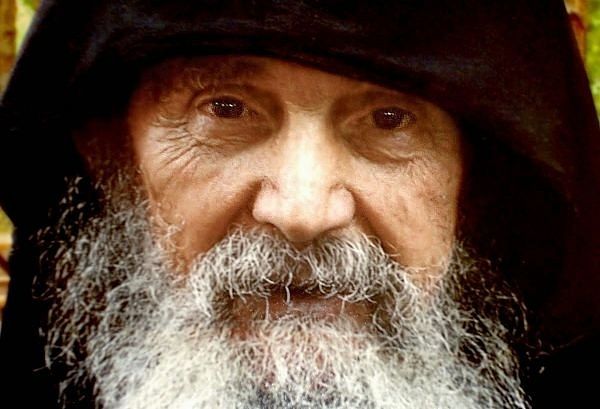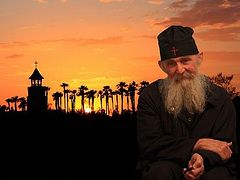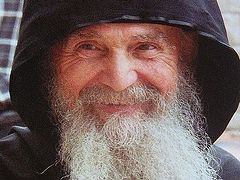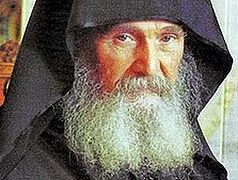The Elder Ephraim recently reached the age of ninety. He has not been functioning as an elder for more than a year because of health issues; and at his age and with his physical condition it is doubtful that he will again function in that capacity. As one who has become somewhat renowned, however, there has occasionally been controversy over him. Most of the spiritual children of his monasteries consider him to be a saint and one who has wrought a miraculous renewal among the Greek Orthodox in North America. This effect did not cease with the Greek faithful but spread elsewhere, as well.. Indeed, the lives of many have been touched and changed by the Elder. However, he has also been under attack at times, and negative opinions have been expressed concerning him—I do not want to approach this subject. But there is one aspect of the work he has accomplished that has been much on my mind recently and this is what I want to write about. I will introduce this topic with a question: What has Elder Ephraim done for monasticism in our land?
I recently celebrated the feast day of the Hermitage where I live. It is dedicated to St. Arsenius of Konevits. He was born in the ancient city of Novgorod in the mid fourteenth century. At the age of 20 he entered a monastery in that area and after 17 years a desire was born within him to go elsewhere. Where did he go? It was to the Holy Mountain.
This was made possible when some elders from the Holy Mountain came to Novgorod. He sought to get a blessing from his abbot to depart with them as they returned. However, the abbot did not want to give him a blessing because he thought that St. Arsenius was a good, obedient and humble monk, and this change was not necessary. But St. Arsenius persisted in asking for his blessing and finally the abbot conceded and let him go.
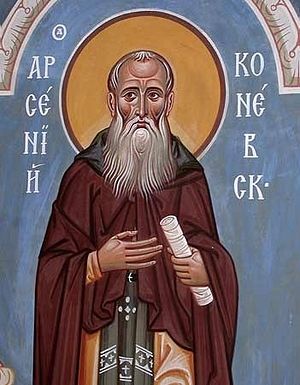 St. Arsenius of Konevits Upon his arrival at the Holy Mountain St. Arsenius discovered a treasure there. What was this treasure? It was the hesychast tradition of our Church. This was something that had been lacking where he had previously lived in Russia. It was about 1390 when he went to Athos and this was a generation after the great lights such as St. Gregory of Sinai, St. Gregory Palamas and St. Maximus Kapsokalivia had lived there. The hesychastic life which they promoted would have been flourishing there at that time. St. Arsenius immersed himself in this life and after several years on the Holy Mountain he returned to Russia, bringing this tradition with him. And this is exactly what the Elder Ephraim planted here in North America for those who choose monasticism.
St. Arsenius of Konevits Upon his arrival at the Holy Mountain St. Arsenius discovered a treasure there. What was this treasure? It was the hesychast tradition of our Church. This was something that had been lacking where he had previously lived in Russia. It was about 1390 when he went to Athos and this was a generation after the great lights such as St. Gregory of Sinai, St. Gregory Palamas and St. Maximus Kapsokalivia had lived there. The hesychastic life which they promoted would have been flourishing there at that time. St. Arsenius immersed himself in this life and after several years on the Holy Mountain he returned to Russia, bringing this tradition with him. And this is exactly what the Elder Ephraim planted here in North America for those who choose monasticism.
Let us take a moment to look a little further into the hesychast tradition. To do this I would like to refer to someone who was a very pious fervent Orthodox man in Russian who lived in the nineteenth century. He fulfilled all of the external rules of the Church; together with his wife they read daily prayers in the morning and evening and also canons and akathists and read the Scriptures. His wife reposed at an early age and as he was handicapped he became a wandering pilgrim. At one point, like St. Arsenius, he experienced a thirst for a deeper spiritual life. you may have already realized that I am speaking about the anonymous Pilgrim in the popular book “The Way of a Pilgrim”.
One day in church he heard the words of the Apostle Paul “pray without ceasing”. He could not get these words out of his mind, he wondered: “How could this be accomplished?” So he sought to find an answer. He heard many sermons on prayer and sought out reputable churchmen whom he thought might be able to help him, but did not find an answer. Finally, while traveling by foot, he met an old monk who convinced him to come back to his monastery, and along the way, he solved his perplexities. As they walked this father began to speak:
Thank God, my dear brother, for having revealed to you this unappeasable desire for unceasing interior prayer. Recognize in it a call from God, and calm yourself….It has been granted you to understand that the heavenly light of unceasing interior prayer is attained neither by the wisdom of this world, nor by the mere outward desire for knowledge, but that on the contrary it is found in poverty of spirit and in active experience in simplicity of heart. That is why it is not surprising that you have been unable to hear anything about the essential work of prayer…The vain wisdom of the world compels them (that is, present day preachers) to apply the human standard to the divine. Many people reason quite the wrong way round about prayer, thinking that good actions and all sorts of preliminary measures render us capable of prayer. But quite the reverse is the case, it is prayer which bears fruit in good works and all the virtues….The Christian is bound to perform many good works, but before all else what he ought to do is to pray, for without prayer no other good work whatever can be accomplished. Without prayer he cannot find the way to the Lord, he cannot understand the truth, he cannot crucify the flesh with its passions and lusts, his heart cannot be enlightened with the light of Christ, he cannot be savingly united to God. None of those things can be effected unless they are preceded by constant prayer. I say ‘constant,’ for the perfection of prayer does not lie within our power….It is just to pray often, to pray always, which falls within our power as the means of attaining pure prayer, which is the mother of all spiritual blessings. (The Way of a Pilgrim, The Seabury Press 1965 pp.6-8)
After reaching the monastery the elder took the pilgrim to his room and continued:
The continuous interior Prayer of Jesus is a constant uninterrupted calling upon the divine Name of Jesus with the lips, in the spirit, in the heart; while forming a mental picture of his constant presence, and imploring His grace, during every occupation, at all times, in all places, even during sleep. The appeal is couched in these terms, ‘Lord Jesus Christ, have mercy on me.’ One who accustoms himself to this appeal experiences as a result so deep a consolation and so great a need to offer the prayer always, that he can no longer live without it, and it will continue to voice itself within him of its own accord. (ibid. pp. 8-9)
The elder ended:
“Now do you understand what prayer without ceasing is?” (ibid. p. 9)
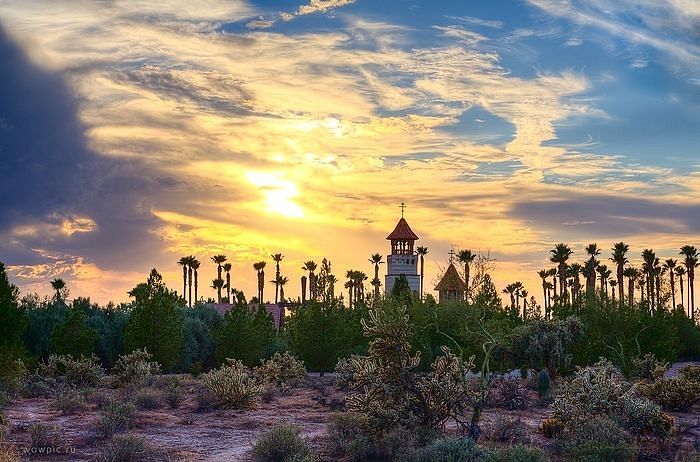 St. Anthony's Monastery. Photo: pemptousia.ru
St. Anthony's Monastery. Photo: pemptousia.ru
Our holy fathers speak of different stages of prayer. First there is oral prayer, then mental prayer, and then mental prayer on the heart level, all of which is the work of man. Afterwards one can experience mental prayer on the heart level which is something more because it is the action of God in which one participates. Finally this action can become firmly established within a man, and so become unceasing. This is where the hesychast tradition can lead one. But it requires an intense struggle and experienced guidance. So for those in America who have chosen monasticism and have the thirst for an intense struggle in prayer as St. Arsenius and the Pilgrim did the Elder Ephraim has brought them the Athonite Hesychast tradition. The value of this treasure is beyond appraisal. This is the unquestionable contribution of the Elder Ephraim to the Orthodox of North America.

